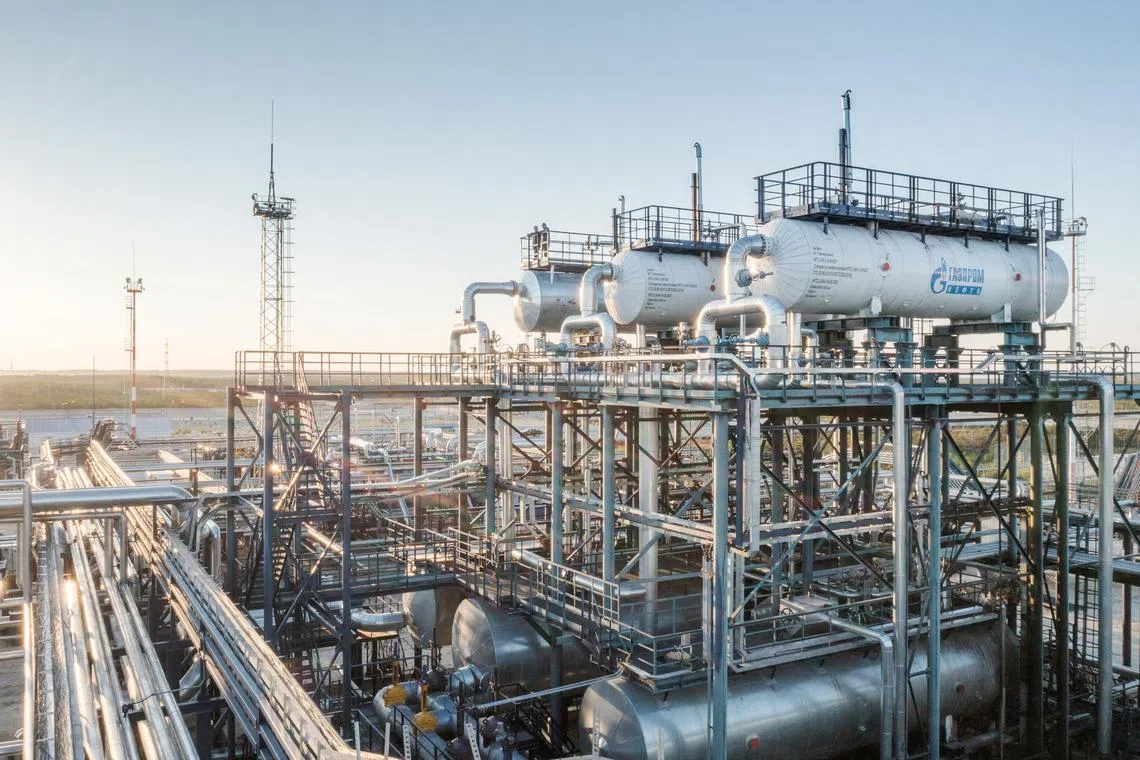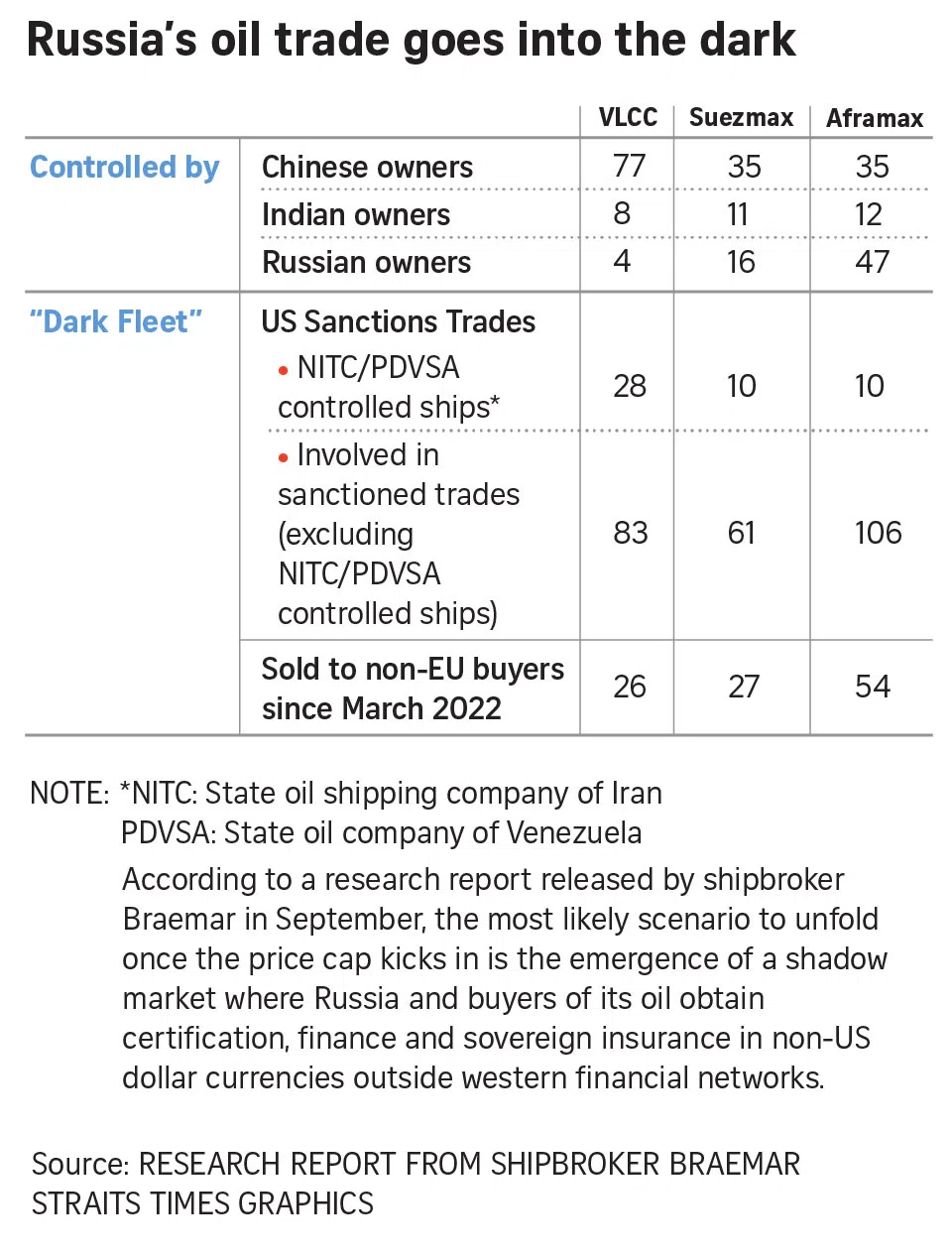Migration of Russia oil trade to smaller firms sparks use of old tankers to ship fuel under radar
Sign up now: Get ST's newsletters delivered to your inbox

The ships used to transport the Russian oil are often referred to as the “dark fleet”.
PHOTO: REUTERS
SINGAPORE – The migration of Russia’s oil trade from large blue chip companies to obscure smaller firms has given rise to a growing fleet of ageing tankers being used to transport the fuel under the radar of Western surveillance, according to industry sources.
These ships, often referred to as the “dark fleet”, are owned and run by firms with limited experience, said Mr Jeremy Weir, chairman and chief executive of global commodity trading giant Trafigura.
Trafigura traded Russian oil prior to Moscow’s invasion of Ukraine on Feb 24, but has since reduced that footprint considerably,
“We are seeing older vessels which would typically be scrapped, being acquired and used to transport these fuels, and quite frankly, this is simply not acceptable in today’s world,” said Mr Weir.
He was speaking at the FT Commodities Asia Summit at the Westin Singapore on Wednesday.
“The problem is when you have got less skilled people in this area dealing with oil of much greater volumes and shipping it at greater distances – because typically in the past, the Russian (crude) would go to Europe but now it’s going to India and China – you have more oil on the water, which gives rise to problems, including raising the risks of accidents occurring,” he said.
Just last month, an ageing supertanker involved in the shipping of sanctioned oil ran aground near a critical pipeline supplying gas
The 21-year-old Young Yong was understood to have completed an illicit ship-to-ship transfer when it ran aground in Indonesian waters.
It was subsequently sanctioned by the United States Treasury
Mr Russell Hardy, chief executive of Vitol, the world’s largest independent oil trader, said the looming embargo on Russian crude
The Group of Seven, including the US, along with the European Union and Australia are slated to implement the price cap
“The likelihood is that the price cap will be sufficiently low and will cause some tension between the Russians and their existing off takers… The business was largely handled by larger corporations and larger consumers in the West in the past, and it will potentially move to smaller traders and smaller shipping companies that do not operate within the G-7 or the EU,” said Mr Hardy.
“And that is the origin of the dark fleet, and the origin of people building up their resources and capabilities in places like Dubai, as one example, so that they can operate without being subject to the price cap.”

Vitol CEO Russell Hardy said the looming embargo on Russian crude will also force out many large corporations unwilling to take the associated risks with regulations around a proposed oil price cap.
PHOTO: REUTERS
In an interview with The Straits Times in September, Ms Catherine Wolfram, deputy assistant secretary for climate and energy economics at the US Treasury, said that under the price cap being proposed, the provision of services for the trade of Russian oil would be banned.
This would include access to insurance, trade finance, banking, brokering and navigation services.
According to a research report released by shipbroker Braemar in September, the most likely scenario to unfold once the price cap kicks in is the emergence of a shadow market where Russia and buyers of its oil obtain certification, finance and sovereign insurance in non-US dollar currencies outside the Western financial networks.
“Russian oil would have to be carried by a combination of Russian ships and the shadow fleet of older tankers with opaque ownership which currently move sanctioned Iranian and Venezuelan crude outside the Western sphere,” the report said.
It did note that Russia would face difficulties when the second embargo on refined petroleum products like diesel and jet fuel takes effect in February.
“Even if Russia manages to tap the dark fleet to move its dirty cargoes, they will face difficulties in redirecting clean exports, as the shadow fleet is almost exclusively meant for lifting crude or fuel oil while Russia owns a very small clean tanker fleet and its smaller tankers are too small to make long haul voyages of clean products economically viable.”



